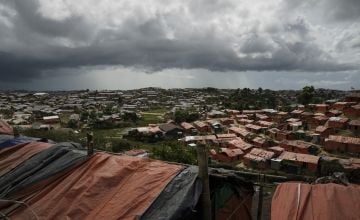
Read our 2024 annual report

Knowledge Hub
Bangladesh hit by Cyclone Mocha

Concern teams in Bangladesh are responding to widespread damage caused by Cyclone Mocha.
The powerful cyclone hit the coastlines of Bangladesh and neighbouring Myanmar on Sunday.
Fears had grown throughout the region on Saturday as the cyclone had developed into the equivalent of a category-five storm in advance of making landfall.
Five districts in Bangladesh had been braced for the devastating impacts of the cyclone and some 750,000 Bangladesh people were evacuated from their homes.
Widespread damage
As the worst of storm had passed by late on Sunday, it looked like Rakhine state in Myanmar had bared the brunt of the damage caused, with up to 90 percent of the area destroyed.
It was feared that Cox’s Bazar, home to over 900,000 Rohingya refugees, would be worst affected. Thankfully these fears did not materialize but over 1,500 of shelters were damaged or destroyed by strong peripheral winds leaving over 8,000 people affected. Over 2,000 of those have been displaced due to the scale of damage to their homes.
There is still significant danger posed by landslides and floods in the wake of the deadly cyclone.
Concern's preparation and response
As Early Warning Systems kicked in, our team in Cox’s Bazar quickly kicked into action with plans put in place and stocks of food prepositioned. We have distributed hot meals to 1,000 Bangladeshi people who were evacuated to a nearby shelter. We are also planning to distribute food to 1,500 households and are prepared to scale up our response if required in the coming days.
Follow us on Instagram
Stay up to date on our work in 25 of the world's poorest countries.





